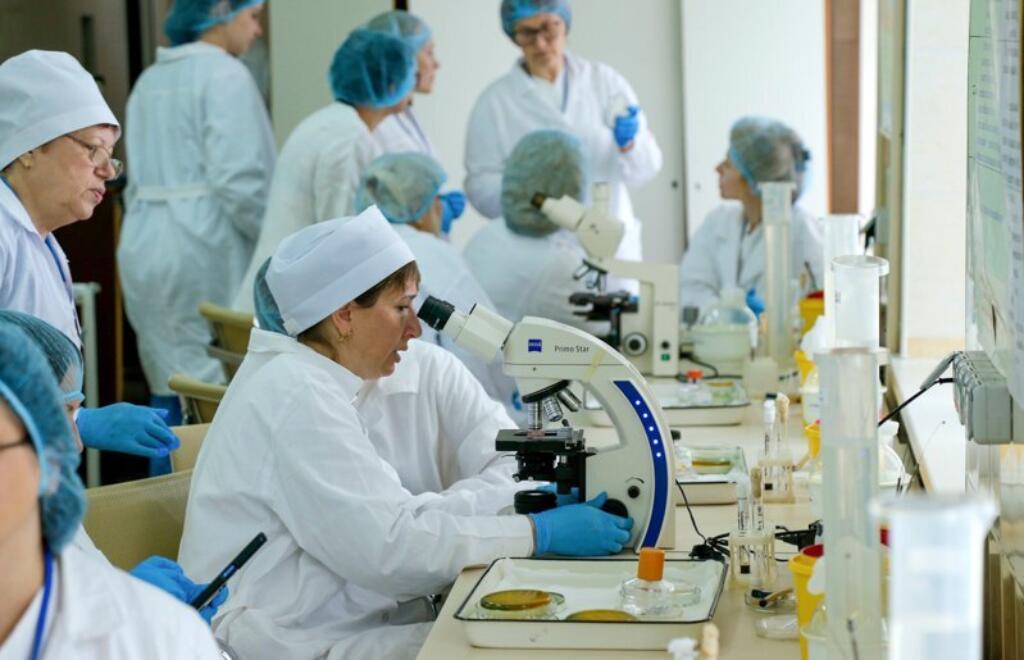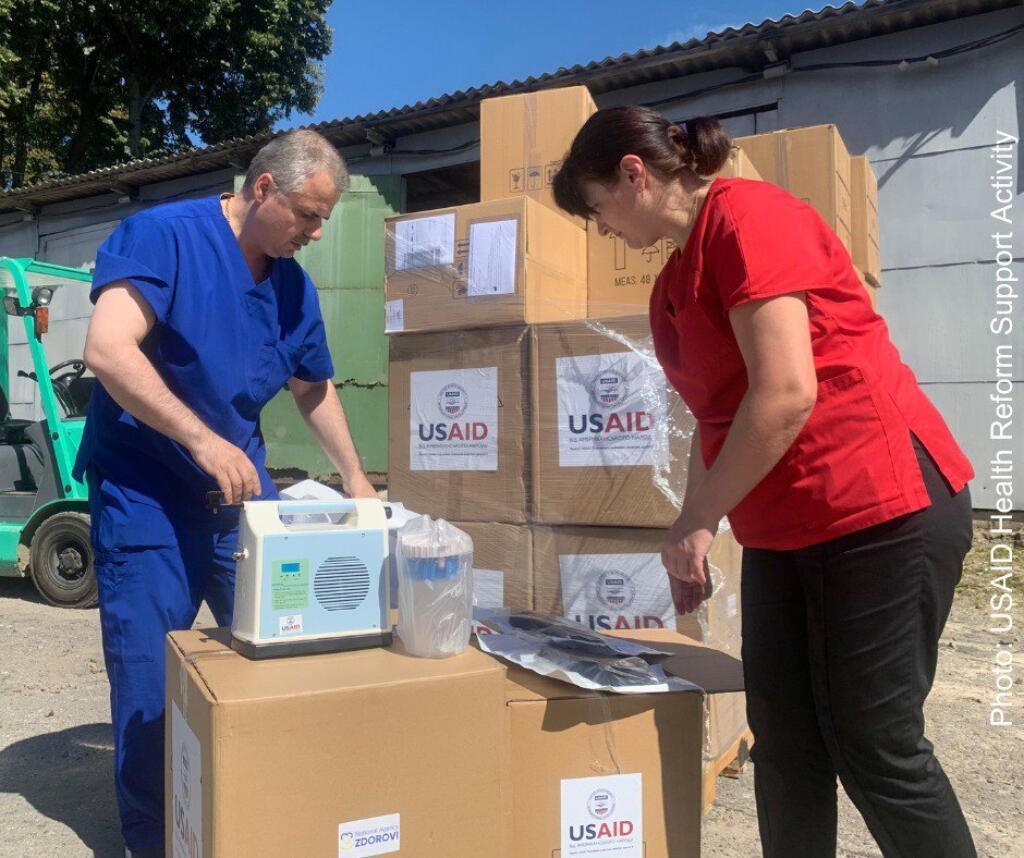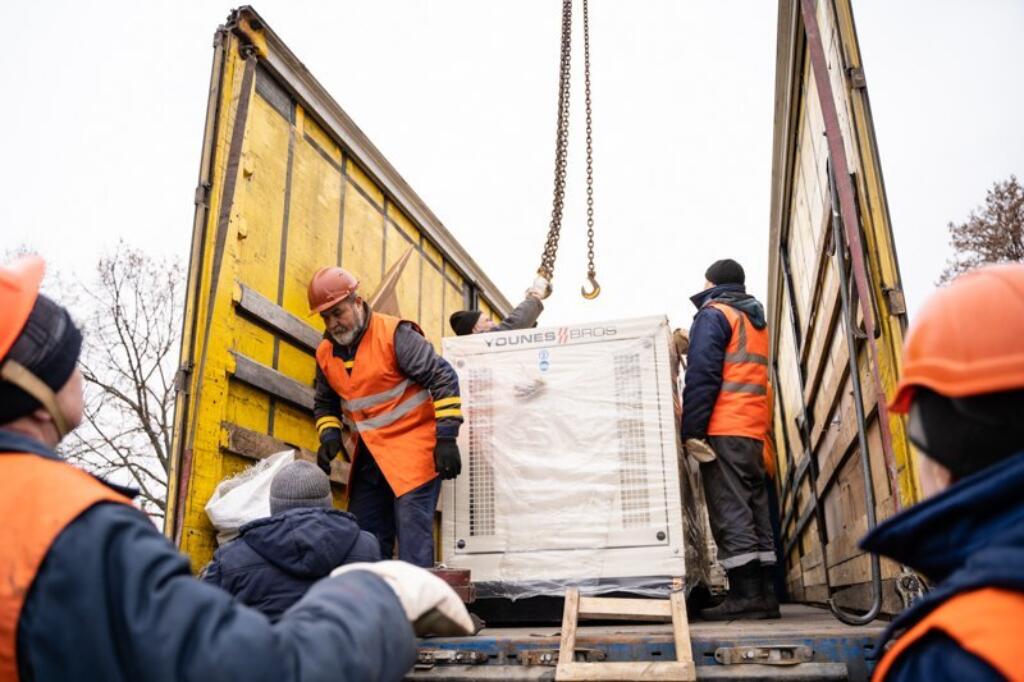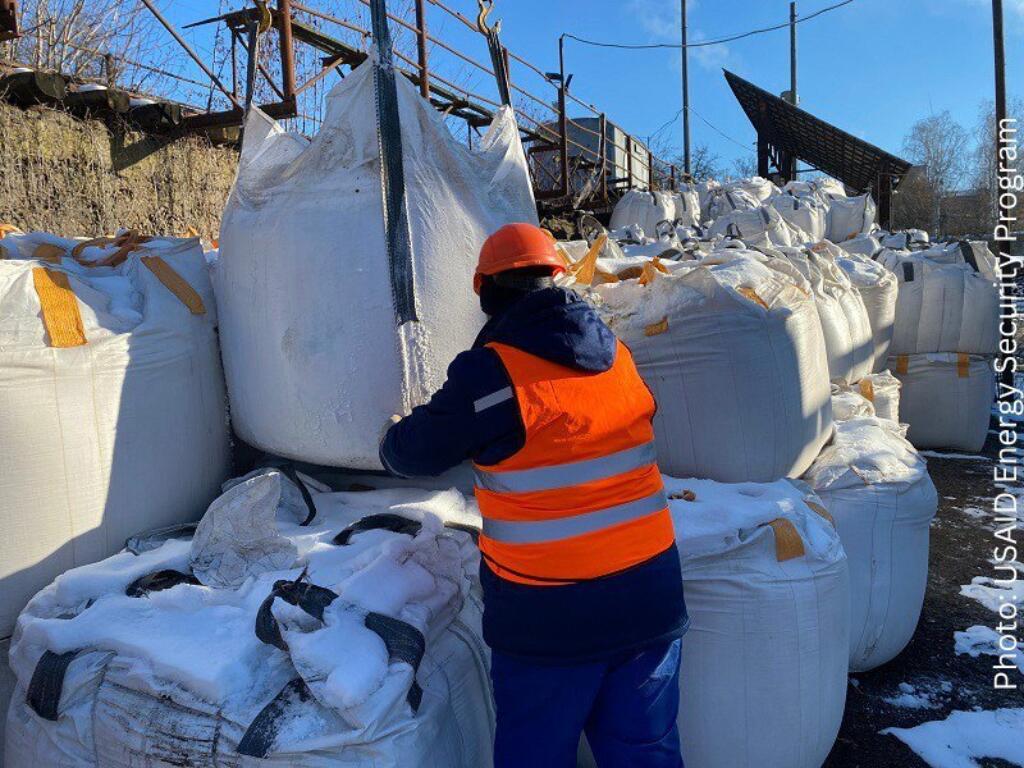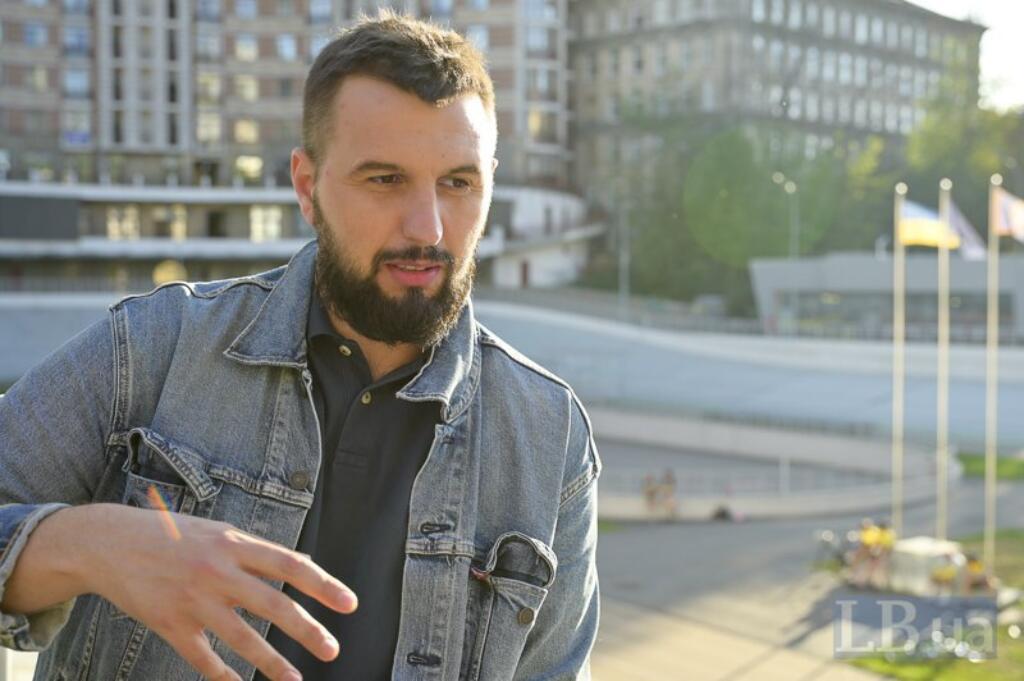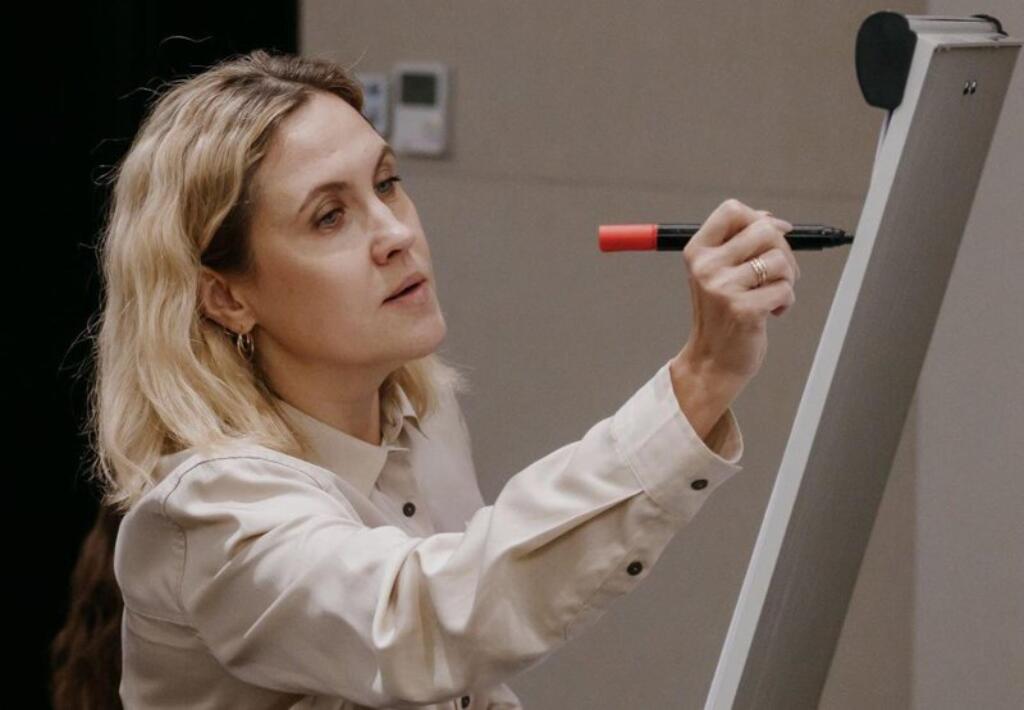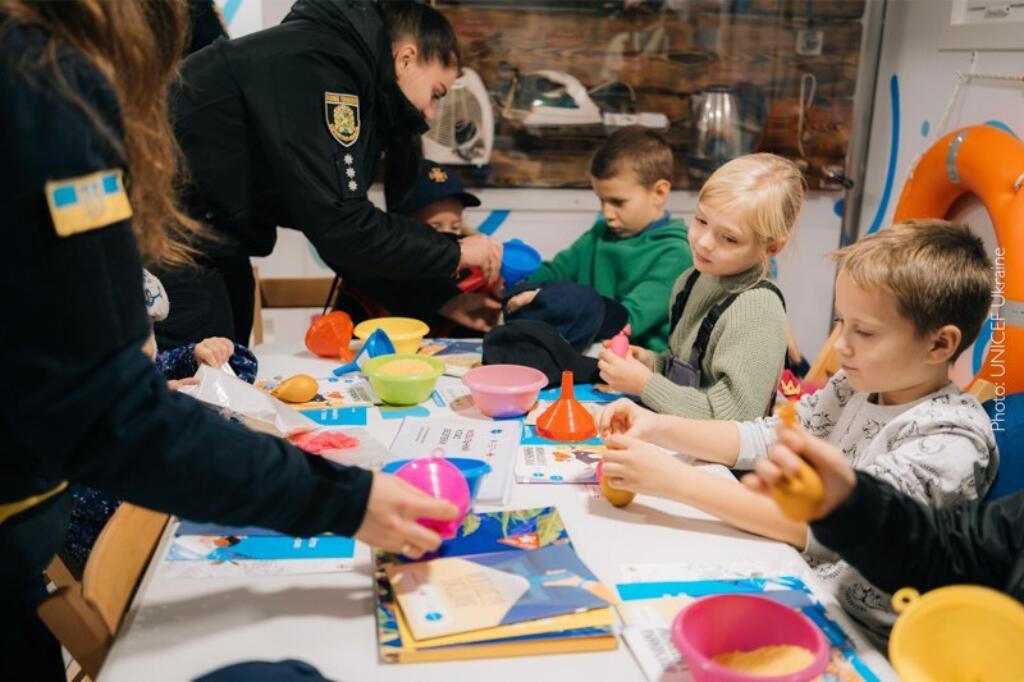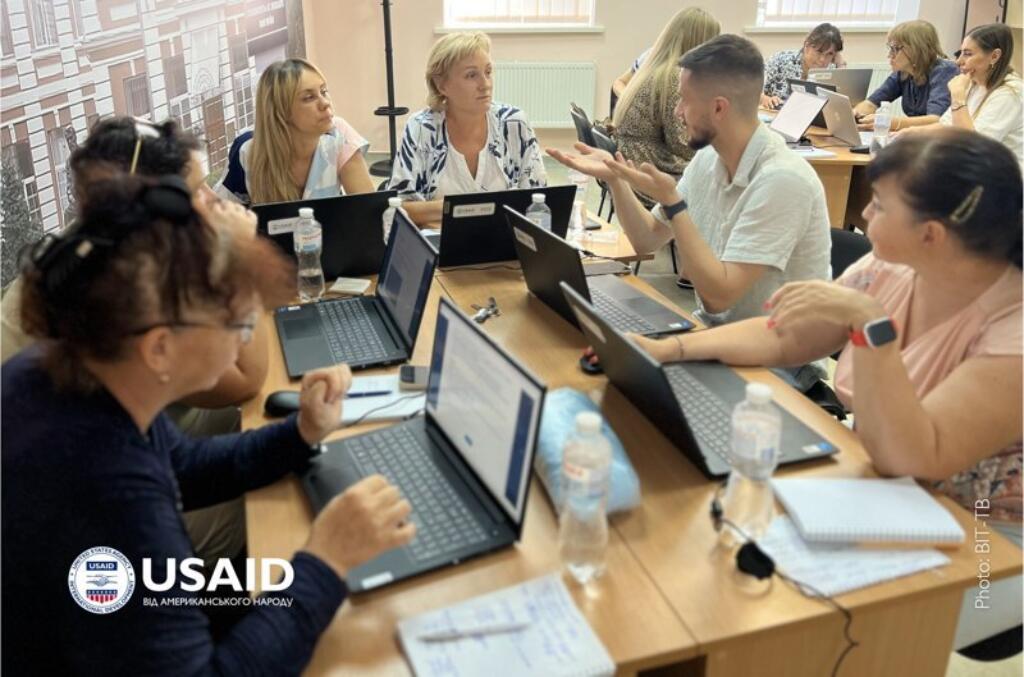Ukrainian article of the week published in the 65th edition of the "What about Ukraine" newsletter on February 20th, 2025. The article was written by Kateryna Amelina for LB.ua and was translated for n-ost by Tetiana Evloeva. Find the original article in Ukrainian here.
Photo credit: EPA/UPG.
On 24 January, Ukrainian NGOs and Government agencies working on projects financed by the United States Agency for International Development (USAID) received letters demanding a halt to those projects.
The USAID logo is found on media and educational platforms, as well as refrigerators storing vaccines, power generators, and modular learning spaces in cities affected by war.
While some of those programmes were about to be wrapped up, others had just begun — like the five-year rehabilitation project that the agency had allocated 13 million USD [~12.4 million euros] in October 2024 or further support for healthcare reform in Ukraine, or the 825 million USD [~789 million euros] promised for the Ukrainian energy grid.
All the projects were halted for 90 days until further notice. The US has stated it will hold an audit and only keep the programmes that suit its interests. So far, no clarifications or further explanations have been offered.
However the prospects are bleak, judging by how Elon Musk, the de facto head of the Department of Government Efficiency (DOGE), is harassing the Agency on X (formerly known as Twitter). The South African tech billionaire has been vocal about his intention to shut it down. Ukraine, therefore, is looking to alternative solutions.
LB.ua reporters showed just how much Ukraine’s healthcare, energy, humanitarian demining, support for veterans, and child protection depend on American funds.
Healthcare: doctors in frontline zones hit by cuts
Launched in 2016, Ukraine’s healthcare reform is one of the largest USAID-funded programs. The Agency funded the two previous phases of the reform. The third — and current — one was designed to be implemented over the following five years. That project consisted of several components, including the development of policies to support the reform, the training for managers of medical institutions and doctors, support for digital medical platforms, and cooperation with the public sector.
“This project was supposed to back up the Ministry of Health and National Health Service of Ukraine whenever they lacked funds for experienced experts to develop strategies and conduct research,” says Iryna Nemyrovych, director of the Ukrainian Health Center (UHC) and expert in healthcare management, who had been part of the reform under Ulana Suprun, former minister for healthcare.
A spokesperson for the Public Health Centre of Ukraine (PHCU) explained that suspended funding would affect:
- public health emergency management
- outbreak response and prevention of infectious diseases
- detection and response to antimicrobial-resistant pathogens
- strengthening HIV prevention, detection and treatment improving the capacity and quality of laboratories.
Today, the experts of the PHCU are assessing the potential impact of the new US policy, while doing their best to provide critical services without any interruption.
“The suspension of funding may affect a significant number of people who receive treatment and support services under those programmes,” said a spokesperson for the PHCU. “[…] Some of those programmes continue their operation based on resources we have available, and we work closely with our partners to minimise the risks for our patients.”
A fair share of the grants was spent on educational projects for doctors. One of those projects had been implemented by the Ukrainian Health Center, with its team offering training for the primary care doctors in communities near the frontline. They were supposed to be trained in using portable ultrasound scanners — as patients getting to a hospital in a reasonable time can often be a struggle near a theatre of conflict. When the training course was almost ready for the launch, they had to suspend the project.
“Those projects were all about moving forward and embracing change, capacity building and hole plugging where the state simply couldn’t afford those things, like procuring additional equipment and training both doctors and healthcare managers,” explains Iryna, adding that healthcare is now in a stalemate.
Sometimes, those grants covered financial aid to power hospitals. For instance, according to our sources in the Health Department of the Mykolaiv City Council, the city’s medical institutions were supposed to receive fuel vouchers under the USAID’s Democratic Governance East (DG East) this January.
Iryna Nemyrovych also mentioned a 50 million USD [~ 47.8 million euros] project on offering rehabilitation to Ukrainians affected by the warfare. However, a spokesperson for PHCU noted that they keep the Ministry in the loop in order to continue operations in critical fields.
Energy: critical aid in security and transparency
Programmes of importance previously funded by the USAID in energy include the Energy Security Project (ESP) and Energy Sector Transparency. Both initiatives were heavily involved in recovery efforts for the energy infrastructure, damaged by shelling.
Ukraine’s Western partners were actively helping Ukraine, providing equipment since the grid was first targeted. This is how the Ukraine Energy Support Fund came into existence under the European Energy Community, which is similar to the national charitable initiative United24, but for the energy sector.
As of late December 2024, the Ukraine Energy Support Fund exceeded one billion euros in donations and commitments from 30 donors, six of which are private companies and NGOs.
For transparency in how that money and equipment are used, the Ministry of Energy launched a special task force to coordinate, obtain and process data on equipment needs and draw draft resolutions regarding the distribution of the aid available. They are assisted by the Energy Sector Transparency initiative implemented by the Energy Sector Transparency think tank run by DiXi Group.
“We assist the Ministry of Energy with collecting and validating the data on the needs of specific companies,” explains Olena Pavlenko, president of the DiXi Group, “which means regularly dealing with thousands of requests. We also help develop the AidEnergy system to digitalise the key processes.”
There’s also the Energy Security Project. The experts of that team conduct energy procurement: they search for and contract the necessary equipment abroad through a competitive process in cooperation with our Western partners. At the same time, the Project also procured various equipment, machinery and materials for energy and utility companies out of their own pocket.
This takes weeks. Not every part of the equipment is easily contractible abroad. Some procurements need to be done to order, which takes months to complete; others may already have a waiting list of customers, including those from other countries. Therefore, the process is complex and tedious.
In addition, support from USAID allowed DiXi Group to pool a team of experts facilitating the Ministry of Energy’s negotiations on Ukraine's membership in the EU.
“As of now, we can’t afford to help the respective ministries prepare for the negotiations, in which energy is a big chunk,” adds Olena.
Apart from those two large projects, there are a number of local ones. The city of Mykolaiv built upon USAID funding to procure fuel for autonomous power sources.
The Ministry of Energy is yet to offer official communication on the matter.
Demining: donors move to cover US slashing of finance
The USA is likely Ukraine’s biggest single partner when it comes to humanitarian demining. According to Ihor Bezkaravainyi, deputy minister of the economy of Ukraine, who coordinates this vital field of expertise, suspension of funding will affect a number of projects in this sphere.
“As of now, it’s hard to tell whether it would directly affect the fieldwork, capacity building, or outreach campaigns because the very international operators who used to rely on the US funding are currently working on redistribution of the funds they do have,” he elaborates. “We also know that they are currently working with other donors to secure the funding for some of the projects that are currently suspended.”
Bezkaravainyi adds that the fieldwork continues, with some of the providers changing their hours (working in shifts) and others finding alternative funding.
The Ministry is also contemplating how to cover the tightness in funding.
“The Government allocated one billion UAH [~ 23 million euros] towards compensation for demining of agricultural fields for 2025,” says Bezkaravainyi. “Also, cashback programs are in place for those who buy Ukrainian demining equipment, and the import of components for demining machines has been kept duty-free and VAT-free.”
The USA has been allocating funds for humanitarian demining of Ukrainian lands since 2022. This includes hundreds of millions of US dollars towards projects like Tetra Tech, which train Ukrainian sappers up to international standards, procuring equipment for demining professionals, running awareness campaigns, and carrying out projects with large international providers.
Most of those projects have already been completed. However, the USA announced a further 102 million USD [~98 million euros] in aid, and only part of these funds has been used.
“As of today, we know that the programmes were suspended for 85 days (starting on 24 January 2025),” adds Bezkaravainyi, “and let me stress that they were ‘suspended’ and not completely and unequivocally terminated. We have to think about how we can proceed with critically important projects, attract new donors and private investors, and expand innovations in landmine action. We are grateful to the United States for its global leadership in countering Russian aggression and all the assistance provided. That aid helped us save thousands of lives, in particular, due to how much land was rendered usable again after humanitarian demining.”
Supporting Veterans: training cut for rehabilitation hub
About 80 percent of veteran projects in Ukraine rely on grants, and most of those grants come from the US — according to Bohdana Levytska, head of the Vesta Foundation and, until recently, a member of the public council under the Ministry of Veterans Affairs.
“While some had to suspend their overall work, we only had to suspend one of our projects, which is sad, but not critical,” says Levytska.
This is the operation strategy for the rehabilitation hub, the Borodianka Centre, which was restored last year after a bomb attack in 2022, and works with veterans. The team was to develop a two-year plan and determine the key indicators, as well as develop specific training for specialists who were to work with veterans.
“We signed the agreement for that project on 30 December, and starting on 1 January, we were detailing our further steps based on our previous analysis of the current state of the Centre in Borodianka and its needs and listing the tasks for its psychotherapists,” says Levytska. “We were supposed to hold our first strategic session on 27 January, however, on 24 January, we received the letter that the funding was suspended.”
She adds that while the grant funds were already transferred to the fund’s accounts, they are prohibited from using that money.
"As of today, a variety of government institutions are coordinating a further action plan, whether we return these funds to donors in full, withhold payment for services already rendered, or keep them in full. That is, the situation is unclear. What is clear, though, is that we can’t use them now,” she explains.
Still, the Vesta team is now looking for funding for their other needs, specifically for building their capacity to provide psychological support, as since late January, according to Levytska, the number of applicants has tripled.
“The demand is enormous, which is something we can’t just ignore,” she adds. “As volunteers, our input is limited, as we still have to provide for ourselves. Plus, it’s often the veterans who do such projects. Take Borodianka’s project alone: my husband is in the military, the partner of our accountant is in the military, both the father and partner of our communications specialist are in the military… We have veterans involved, from logistics specialists to instructors. This is exactly the type of work that is useful for those returning to civilian life or for those looking for a crowd to join.”
Apart from psychological support, this sphere also covers plenty of awareness programmes, like the Communication with Person in Grief project by the NGO Vilnyi Vybir or training primary care doctors in interacting with veterans by the NGO Prostir Mozhlyvostei.
“We are a country of social support, with a war in active phase, which, of course, adds to the mix,” says Levytska. “Were it not for the active phase of the war, we would have fewer veterans and therefore, the suspended funding would be less noticeable. However, the demand is huge, making it impossible to ignore. Therefore, we find ourselves in a situation where the demand isn’t going anywhere; it’s the opportunities that disappear.”
Child protection and education: cuts to mobile therapists for kids in frontline areas
Of the 30 NGOs that form the Ukrainian Network for Children's Rights, 30 percent reported a freeze in their programmes, says Darya Kasyanova, head of the board.
“This is a lot of humanitarian projects focused on families with children, including ones focused on violence prevention and response,” explains Kasyanova. “This affects the frontline regions, namely Kharkiv, Zaporizhzia, Donetsk and Dnipropetrovsk, where a lot of families with children resettle from the occupied territories. Which means those projects are really in demand. We are talking not just workshops but also direct aid for families with children.”
For instance, she told us about mobile crews of psychotherapists that respond to cases of violence.
“This situation affected very complex cases related to the sexual abuse of children, and we are now trying to figure out where we can redirect those cases because we can't just stop working with them," says Kasyanova.
“They work with the children who stay in those areas, for instance, and guide them through pre-school,” says Kasyanova.
A lot of the network’s activity has to do with repatriating the children that Russia deported and rescuing children from the occupied areas. That, too, is in jeopardy due to suspended funding.
“We have to establish communication with the occupied territories to inform the local families with children of the opportunities to flee,” says Kasyanova. “This is a very complicated process, and we lack the funds to even join those channels of communication. We really hoped that we would have a project that would help raise this awareness.”
There are also recovery projects, like repairing bomb shelters in educational institutions in the areas where parents cannot be persuaded to leave. In Mykolaiv, bomb shelters at schools were financed by US funds.
“This was supposed to offer children and teachers alike more safety in emergencies,” shares a source at Mykolaiv Development Agency.
Speaking of education, Anna Novosad, co-founder of the savED charitable foundation and former Minister of Education and Science said that the suspended programmes involved the building and upkeep of modular learning spaces.
“By 25 January 2025, we, together with our lead from the global development and education organisation IREX, managed to install four of the 20 modular learning spaces,” explains Anna in her post. “Those are the communities whose schools were destroyed by the Russians (in the Kyiv, Mykolaiv, and Dnipropetrovsk regions), and those modular learning spaces became the only educational facilities spaces in each of them.”
They also had to suspend the tutoring programme for the frontline and liberated communities of the Mykolaiv and Kharkiv regions.
“We are speaking of 22 local tutors (as a rule, those are teachers or extracurricular tutors) who used to work extra hours with the children who don’t have access to offline education,” says Novosad. “Dozens of other centres of our Foundation continue their operation, and in the near future, we are planning on re-establishing these.” Novosad adds that the Foundation is actively seeking alternative funding.
The list of areas where the American funding helped build capacity is far from exhaustive. Some other fields include media, businesses, farming, local governments, recovery efforts, science and research, and safety and security.
For instance, the programme of restoring the radiation monitoring system at Chornobyl NPP also depended on US funding, according to the journal Science. The laboratory at the National Academy of Sciences of Ukraine, which the Russians looted during the occupation, also needs restoration.
Right before the funding was suspended, an agreement was reached regarding the installation of new equipment for monitoring radioactive waste and the creation of a new dosimeter control system for the Chornobyl NPP personnel.
On 28 January, president Volodymyr Zelensky announced that Ukraine was looking for alternative solutions and that government officials were expected to present a report on humanitarian programmes affected by the suspension of funding. He said that the critical programmes will be funded from the State budget.
A spokesperson for the respective committee of the Verkhovna Rada adds that negotiations with other Western partners are already underway. Over the following six months the parliament hopes to close the gap in funding for key programmes.
